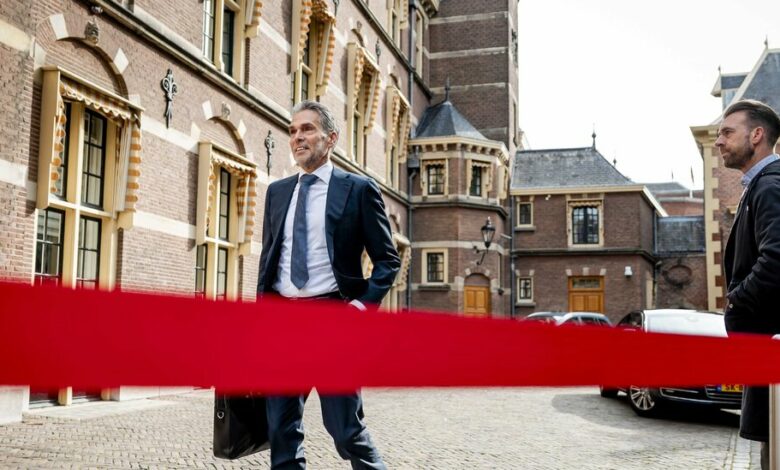What you need to know about the Netherlands’ new far-right government

The Netherlands swore in its first far-right government on Tuesday, more than seven months after elections sent shock waves through the Dutch political system.
The new government has promised to govern the Netherlands differently after almost 14 years under Prime Minister Mark Rutte. The coalition was formed after months of negotiations, fueled by the success of the party of right-wing leader Geert Wilders in the November elections.
“This is an experiment for the Netherlands,” said Armen Hakhverdian, a political scientist at the University of Amsterdam.
The Netherlands, long seen as a bastion of liberalism, is one of many European countries that have seen electoral shifts to the right. Last year, Italy voted for a far-right leader and Slovakia elected a populist president with ties to Hungarian Prime Minister Viktor Orban; and this weekend in France, the far right surged in the first round of parliamentary elections.
It remains to be seen how the style of government — and its far-right leanings — will fare in the Netherlands, a country of nearly 18 million people whose political system rests on a culture of consensus-building and the art of compromise. There could also be broad implications for the country’s position on the international stage.
Here’s what you need to know about the new government and its role in Europe:
How does it look?
The party of Mr Wilders — a populist leader known for his anti-Islamic stance — won the largest share of the vote in November’s election. Long anathema to most other political parties, in part because of his anti-Islamic rhetoric, Mr Wilders said in March he would decline the premiership in a bid to boost the chances of forming a right-wing coalition.
The new government consists of four parties that participated in the negotiations: Wilders’ Party for Freedom; the People’s Party for Freedom and Democracy, a centre-right party that was in power for almost 14 years; the Farmers’ Citizen Movement, a populist pro-farmer party; and the New Social Contract, a new centrist party.
Together they hold 88 seats in the 150-seat House of Representatives, a comfortable majority.
The parties have appointed Dick Schoof, a former head of the intelligence service without any party affiliation, for the role of prime minister.
Will Wilders’ influence decrease?
Mr Wilders will retain his seat as leader of his party in the House. And while he will not be prime minister, he will still have considerable influence on the new cabinet. His Party for Freedom also supplied most of the ministers and state secretaries to the new cabinet, including the crucial position of minister of asylum and migration.
According to Simon Otjes, university lecturer in Dutch politics at Leiden University, his seat in the House of Representatives may make him feel freer to say what he wants, as he is not responsible for maintaining unity in the cabinet.
After winning the election, Mr Wilders appeared to moderate some of his most extreme positions, including seeking a ban on mosques and Islamic schools and a Dutch exit from the European Union. But the appointment of some of his most hard-liners to powerful ministerial posts — including a who embraced the white nationalist “great replacement theory” — suggests that Wilders could pressure them to push through some of his most controversial positions.
What are the implications of this for European relations?
The Netherlands has long wielded outsized influence in the European Union. Outgoing prime minister Mark Rutte was seen as the unofficial leader of the bloc’s “frugal” nations — a fluid grouping of northern countries that favor limited EU spending — and was known for his negotiating skills and connections.
That could all change with Mr. Schoof as Dutch leader. As an impartial prime minister with no political experience, he could struggle to wield the influence in Brussels that the Netherlands has grown accustomed to under Mr. Rutte, political experts said.
Mr Hakhverdian, a political scientist, said that international affairs played only a minor role in the election campaign, which was dominated by the theme of migration.
“This is a cabinet with few international ambitions,” he said.
Mr Rutte, who will become Secretary General of NATO, used his farewell message as Prime Minister to insist on continued support for Ukraine in his war with Russia. Critics have accused Wilders of being pro-Russian, and pro-Kremlin media hailed his election victory. Although he has spoken out against supplying weapons to Ukraine in the past, Wilders in February has expressed his willingness to consider more military aid to the country.
What’s next?
With an impartial prime minister and a less detailed coalition agreement, the four governing parties said they would work together in a slightly different way than previous Dutch governments, in an attempt to create more distance between the cabinet and the House. Part of that was a promise to install a cabinet with a large number of political outsiders.
But most of the 29 ministerial posts have gone to prominent members of the four parties, and the cabinet has a clear right-wing imprint – suggesting it may not be as far removed from the House of Representatives as initially suggested.
The ministers and secretaries will get to work immediately, but there are still deep differences of opinion between the four parties and mutual trust seems limited after the long and difficult coalition negotiations. That could make it difficult to get their campaign promises through the House of Representatives.
Moreover, some of the promises Wilders made during the election may be unrealistic or unconstitutional, Hakhverdian said. If the government fails to deliver on its promises on issues such as migration or nitrogen emissions, Hakhverdian said, confidence in the rule of law and democratic values could come under pressure.
“The signs are not good,” Mr. Hakhverdian said. “I wouldn’t bet on this government lasting four years.”




